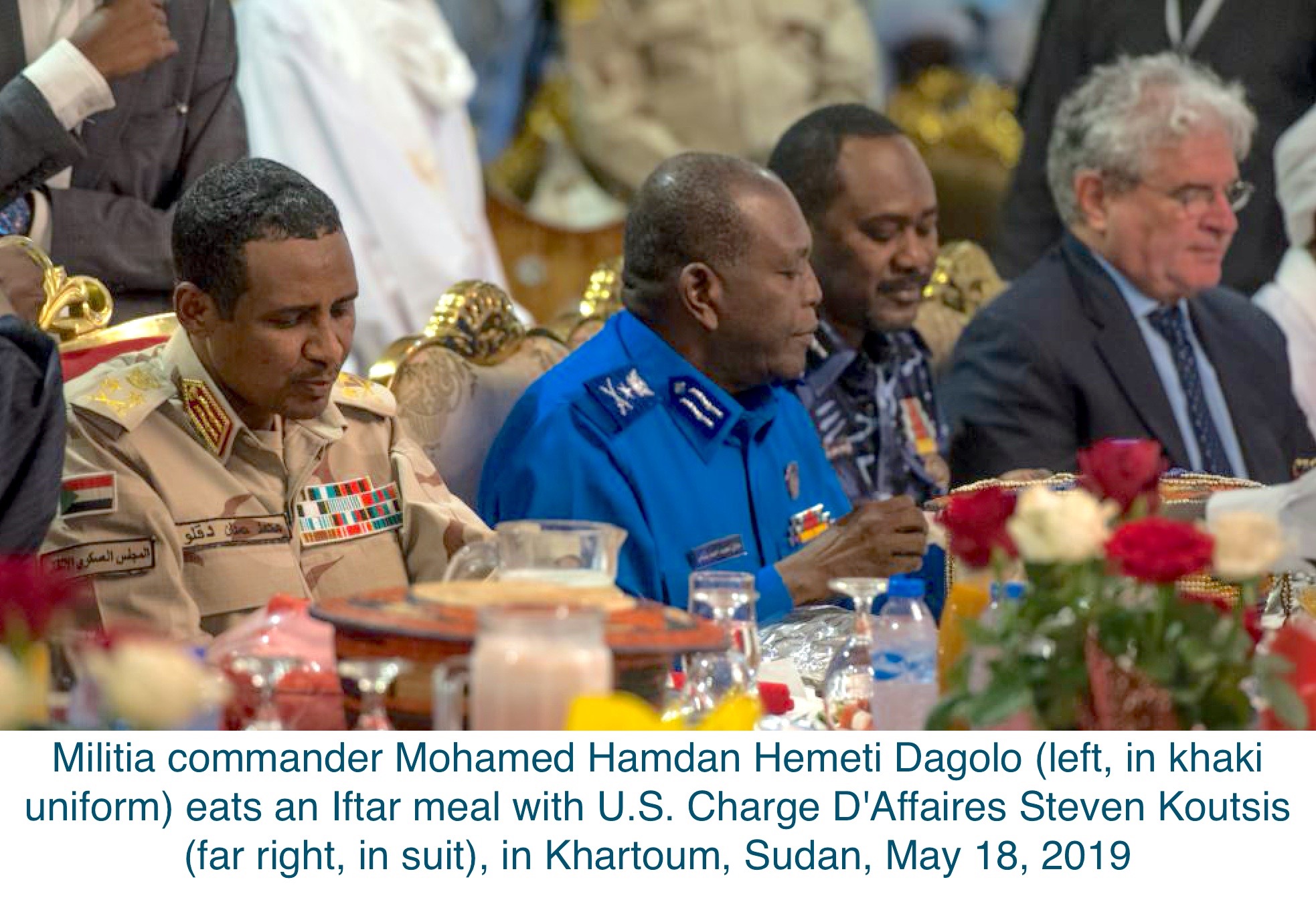U.S. Sudan Policy is a disaster, but the power to respond to today’s massacre in Sudan is clear
Eric Reeves | June 3, 2019 | https://wp.me/p45rOG-2r0
It is still far too early to know that number of people who are dead, dying, wounded, and at risk in medical facilities under attack and siege by the Rapid Support Forces led by Lt. General Hamdan Dagalo (“Hemeti”), deputy chair of the Transitional Military Council (junta). Some reports from sources on the ground in Sudan put the number of dead at over 30 (noon Eastern Standard Time, June 3, 2019).
The international community failed to warn off the TMC junta from this brutal attack on unarmed Sudanese civilians, even as the junta was receiving a bright green light from Saudi Arabia, the Emirates, and Egypt. The evidence of an impending attack, including increasing violence against demonstrators, has been clear for days now; on Saturday (June 1, 2019), the TMC declared that the “sit-in has become a threat to the country.” And yet declaring, in any sort of effective way, that a violent clearing of the sit-in demonstrators near Army headquarters was unacceptable seemed to be too much for Western diplomats.
The intense consultations between the TMC junta and the three Arab countries I name have clearly had as their purpose securing the support the junta felt necessary to move forward. Notably, we know a great deal more about how the UAE in particular uses its money and power in light of a superb and powerfully revealing account of Emirati Crown Prince Mohammed bin Zayed (https://www.nytimes.com/2019/06/02/world/middleeast/prince-mohammed-bin-zayed.html?searchResultPosition=1 ), and in particular the nefarious ties between the UAE and President Trump and his family, in particular his fatuous son-in-law Jared Kushner. The Trump ties to Saudi Arabia’s Crown Prince Mohamed bin Salman are even more nefarious and corrupt.
And when it comes to Egypt, President al-Sisi has long been given a pass by Western countries, including the U.S., which continues to fund his military in profligate fashion.
What this means is that there is plenty of leverage, were the Trump administration willing to use it with the Emirates, Saudi Arabia, and Egypt. There is no evidence that such leverage will be used to benefit the people of Sudan.
Even so, there are a number of actions the U.S. and other countries could take—today—that would pressure the Khartoum junta:
• Countries, as well as international, and regional organizations, can declare that they will never recognize the legitimacy of TMC rule in Sudan;
• All diplomatic and economic initiatives with Sudan should be frozen unless to do so would directly harm the most vulnerable Sudanese (let’s recall the citizens of the uprising engaged in an extremely successful two-day general strike this past week, and have shown a willingness to shut down Port Sudan);
• Downgrade all Sudanese diplomatic presence abroad;
• In the case of the U.S., the first step should be the immediate removal of Steven Koutsis as Charge d’Affaires in Khartoum. His decision to share an Iftar meal with Hemeti two weeks ago gave an implicit signal that the U.S. felt this ruthless génocidaire was someone who could be dealt with on these terms of diplomatic nicety. Today’s massacre makes clear just how egregiously bad Koutsis’ judgment has been on this and other critical issues (e.g., the continuing humanitarian embargo imposed by al-Bashir, and sustained by the junta, on rebel-controlled areas of Blue Nile and South Kordofan);
• Pressure the African Union to make good on its promise to suspend Sudan’s membership in the AU if there is no transition to civilian governance—and make sure to let African countries know their votes will be watched when the moment of reckoning comes;
• Work collectively to convene an emergency meeting of the UN Security Council—and force Russia or China to veto stiff resolutions condemning the TMC; efforts should begin to prevent the TMC from representing Sudan in the General Assembly;
• Assist the International Criminal Court by providing evidence against those members of the TMC leadership that have engaged in massive war crimes, crimes against humanity—or in the case of Hemeti, genocide.
But the obvious first step is condemning today’s massacre in the strongest possible terms and declaring emphatically that there will be no recognition of the TMC junta as the legitimate ruling power in Sudan.
Absent these measures, it will be difficult to hear words of remorse, or regret, or disapproval as anything but feckless, expedient measures.
